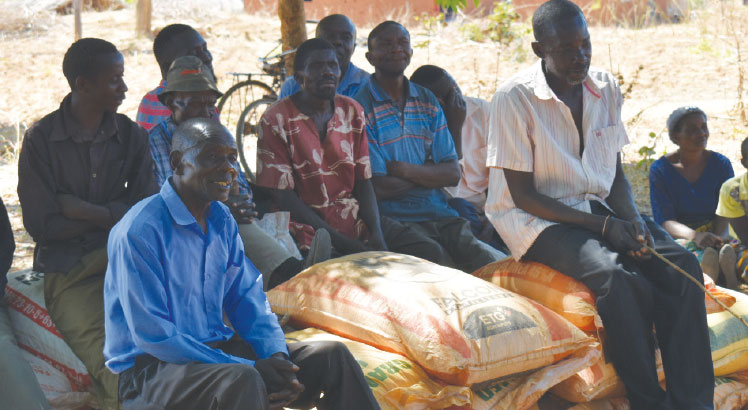Life has not been easy for Deliwe Mvula of Chiputa Mvula Village, Traditional Authority Mzukuzuku in Mzimba District.
The peasant farmer has endured dwindling crop yield from her barren field as fertiliser prices skyrocket.
She can no longer afford chemical fertilisers, whose prices have more than quadrupled from K20 000 to more than K100 000 within three years.
“The falling crop harvests due to loss of soil fertility and unpredictable rains left me struggling to feed my household of seven. We couldn’t overcome perennial hunger,” she says.
For the 55-year-old mother of five, farming became a painful routine.
Comsip Cluster members in Chitipa rest on their bags of fertilisers
“We could do all necessary farming activities only to be let down by crop failure as a bag of fertiliser was beyond our reach,” she narrates.
Like many needy farmers, she seldom received subsidised fertiliser and seed under the Malawi Government-run Affordable Inputs Programme (AIP) introduced in 2005.
The constrained farmer often harvested three bags of maize from her half-acre field, just enough to feed her family for two months.
Last year, she was selected for the Climate-Smart Enhanced Public Works Programme in which members of ultra-poor households receive money for doing communal tasks to conserve land and water.
Mvula received K28 000 after working for 24 days.
She alongside 33 other beneficiaries in her neighbourhood formed the Greenlight Community Savings and Investment Promotion (Comsip) cluster to improve financial literacy and business management. Since then, they have been saving part of their earnings and getting soft loans to power their emerging businesses
Mvula says her life is on the rise.
“I borrow from the group to boost various small-scale businesses that have increased my family’s income and we get our needs easily,” she says.
Her colleague Mary Banda, 75, sells cassava.
“The initiative has made me so productive in old age that I regret the lost years,” she says.
Banda borrowed K50 000 from the group and invested in cassava production to improve her income, food security and livelihood.
Comsip is implementing the livelihoods support programme under the nationwide Social Support for Resilient Livelihoods Project (SSRLP) to eliminate hunger and poverty in target households.
The safety net programme is funded by the World Bank’s contribution to the Multi-donor Trust Fund through the National Local Government Finance Committee.
The programme targets 590 000 beneficiaries, including 64 000 who receive monthly cash-outs under the nationwide Social Cash Transfer Programme and 471 000 listed for the climate-smart public works.
Apart from improving the participants’ economic status, Comsip encourages them to save for the lean days, including buying farm inputs with far higher yields.
Thanks to this, Mvula can afford fertiliser at commercial prices.
She no longer whines missing out on the State-funded subsidy this growing season.
“I have weaned myself from AIP since I’m no longer poor. This growing season, I saved enough to buy five bags of fertiliser,” she brags.
Banda is at peace after buying two bags of fertilisers and improved seed.
“Nothing can stop me from producing more,” she says
By last week, 41 members of the Chankhalamu Cluster in T/A Mpherembe, had bought enough fertiliser for their fields.
Cluster leader Baxter Malinga says the group is on the way to achieving food security despite the harsh effects of climate change and breached soil.
“When the rainy season starts, each member has at least two bags of fertilisers, enough to produce enough food for their households,” he says.
Alex Mulenga of Nakamugudule Cluster in Chitipa District says nothing can stop productive minds from walking out of poverty.
“We’ve become productive in all aspects of our lives. We want to produce more for food for our good,” he says.
Lusekero Cluster facilitator Matilda Singogo says the initiative has empowered them to embrace farming as a business, not a hand-to-mouth activity.
“Since we are assured of producing more than we need to feed our family, we sell the surplus,” she says.
Inkosi Mzukuzuku is happy that his community is becoming self-reliant.
“It is exciting to see cluster members putting their eyes on income-generating activities and buying the necessary farm inputs instead of waiting for food aid and other handouts,” he says.
Chitipa District Council community development officer Haddy Mulenga commends Comsip for improving the livelihoods of people once stuck in abject poverty.
Comsip Cooperative Union Limited development communication officer Mercy Kayuni is pleased that their interventions are empowering ordinary Malawians to have better lives despite price shocks triggered by disruption in global supply chains by the Russia-Ukraine War as well as the 44 percent devaluation of the kwacha.
She states: “The initiative is successful as thousands put together their savings to buy fertiliser even though the kwacha devaluation pushed the price from K65 000 to K107 000 per bag.
“We fear this may affect the purchase of fertiliser as they had planned.”
The post Empowering communities to purchase farm inputs first appeared on The Nation Online.
The post Empowering communities to purchase farm inputs appeared first on The Nation Online.
 Moni Malawi
Moni Malawi 

